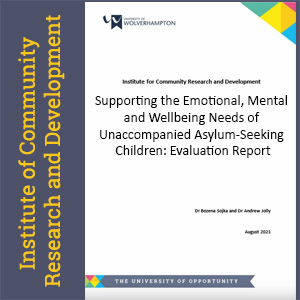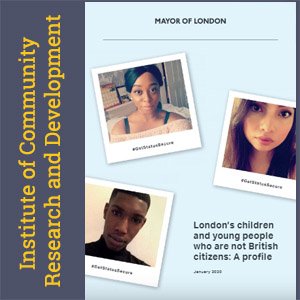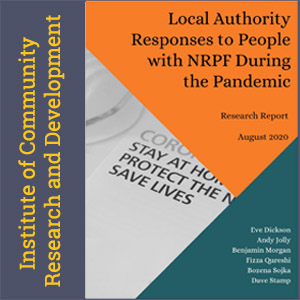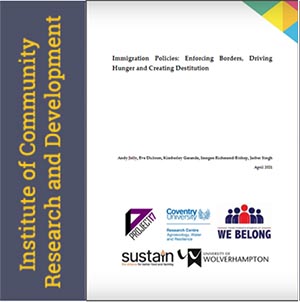
Immigration and Migration
The ICRD’s work in this area has a particular focus on the needs of migrants and the responses of local authorities.
Recent externally funded projects include:
- Local Authority responses to people with no recourse to public funds (NRPF) during the pandemic
- London’s Children and Young People who are not British Citizens, funded by the Mayor of London
- Evaluation of the West Midlands Children’s Services Controlling Migration Fund Programme for Unaccompanied Asylum Seeking Children
Research from this thematic area has received national recognition, underpinning the following call in the Department for Work and Pensions report ‘DWP’s response to the coronavirus outbreak’: 'The Government should publish or at least clarify existing guidance for local authorities on what support they can provide for people with NRPF, including…whether measures such as the hardship fund are classed as public funds or not.'" (Hansard 684).
ICRD research staff associated with this theme:
Current projects
Dr Bozena Sojka and Dr Andy Jolly evaluated the West Midlands Children’s Services Controlling Migration Fund Programme (hosted by Solihull Metropolitan Borough Council) that seeks to determine the effectiveness of the programme and the outcomes and results being achieved for Unaccompanied Asylum Seeking Children (UASC). The West Midlands Migration Forum programme, commenced in November 2017, seeks to coordinate Controlling Migration Fund Programme (CMF) investment training, workforce development and service support across the region covering education, health, social care and community safety working with all local authorities in the West Midlands to improve the outcomes experienced by UASC arriving and settling in the West Midlands region. We focus on evaluation of an innovative and holistic approach applied by the UASC West Midlands Forum to ensuring that these vulnerable children and young people receive a dignified and caring response that is solution focused, addressing local concerns with regards to the communities they find themselves in.
Dr Bozena Sojka and Dr Andy Jolly evaluated the Wellbeing Project 'Supporting the Emotional, Mental and Wellbeing Needs of Unaccompanied Asylum-Seeking Children’, that was designed to introduce a coordinated approach to providing for the needs of UASC living in Wolverhampton and develop services with the professional skills to respond appropriately to deal with their emotional health and wellbeing issues. This is important because relatively little is known about how this kind of coordinated approach assists in working with UASC at Local Authority level. The findings from this evaluation suggest that the ‘Wolverhampton model’ of collaboration has effectively developed coordinated services that in turn have a positive impact on UASC overall wellbeing.
The West Midlands is a highly diverse area where 10.8% of population identifies as Asian, 3.3% constitute Black population and 2.4% of the population is of Mixed ethnicity. This makes the West Midlands, after London, the most ethnically diverse region in England. Net migration to the UK was estimated to be 258,000 in 2018. This is less than 336,000 in June 2016, just before the EU referendum. The population of the West Midlands is estimated to be 5,800,743, the largest city being Birmingham. Most immigrants residing in the West Midlands live in Birmingham. According to the WHO’s Global Action Plan ‘Promoting the health of refugees and migrants’ (2019-2023) addressing the health and well-being of refugees and migrants in an inclusive manner improves overall global health. With aim to address the health and well-being of refugees and migrants living in Birmingham Dr Bozena Sojka and ICRD were commissioned by the Public Health Division at Birmingham City Council to conduct a joint strategic needs assessment (JSNA) analyses of health needs of migrants and refugees living in Birmingham.
In the UK there are an estimated 674,000 people who have ‘no recourse to public funds’ (NRPF) because of their irregular migration status, including 106,000 UK born children. This population includes refused asylum seekers, clandestine entrants, and those who have overstayed a visa. There are also an unknown additional number of people with temporary leave to remain in the UK who are subject to the NRPF condition and who are at risk of losing employment as a result of the pandemic. This population is at high risk of poverty and insecurity, but little is known about their experiences during the current pandemic.
Dr Andy Jolly and Dr Bozena Sojka worked with partners from the third sector including Migrants’ Rights Network, Project 17, ASIRT, and the Public Interest Law Centre on a rapid response project to understand and map local authority responses to people who are subject to the NRPF condition during the pandemic. The project was funded by the Paul Hamlyn Foundation and used an innovative mix of case studies, survey data and welfare diaries to build up a picture of how people with NRPF have been supported during the lockdown.
New Publication
We are proud to share to share our latest publication, 'Immigration Policies: Enforcing Borders, Driving Hunger and Creating Destitution'
There is a long history of immigration control and welfare conditionality in the UK, but the interaction between immigration policies and food poverty is under-researched. This article outlines the links between immigration control and food poverty or destitution in the UK. Drawing on insights from the existing literature and a structured discussion at a participatory workshop for researchers and practitioners, the article identifies issues for research and practice around the issue of the No Recourse to Public Funds (NRPF) immigration rule and food poverty. We argue that future research should take a rights based approach to immigration and food poverty that engages with both the history of immigration control and the intent of public policies such as the NRPF rule.


/prod01/wlvacuk/media/departments/media-and-communications/images-18-19/220325-Engineers_teach_thumbail.jpg)
/prod01/wlvacuk/media/departments/media-and-communications/images-18-19/BBR_logo_large.jpg)
/prod01/wlvacuk/media/departments/media-and-communications/images-18-19/Wolves-Story-Thumb.jpg)
/prod01/wlvacuk/media/departments/media-and-communications/images-18-19/220505-BAS9-School-Showcase-Resized.jpg)
/prod01/wlvacuk/media/departments/business-solutions/images/banners/business-we-back-you-500x250.jpg)


